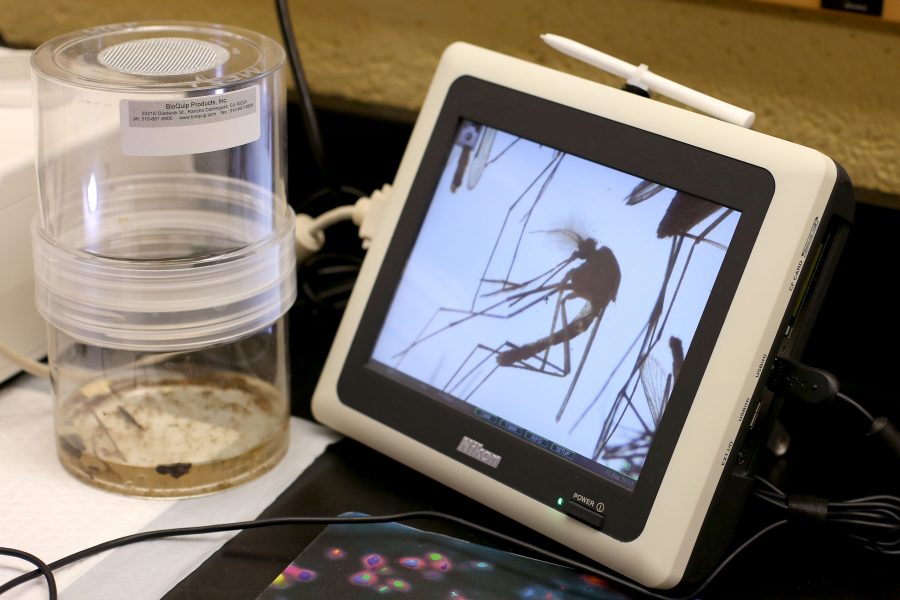The opportunity for Zika to spread in the El Paso community came on Monday, Aug. 15, from a man who had traveled from Florida to El Paso. It is confirmed by El Paso Public Health Director Robert Resendes. According to a press release, the man does not represent a threat to the community since he has already begun recovering.
UTEP Director of Infectious Disease and Immunology Douglas Watts said that when talking about the Zika virus, the following factors must be taken into account–the rapidly growing population, increased transportation and global warming benefit the spread of the virus. In other words, globalization helps spread the transmission of the Zika virus.
According to Watts, there is still danger for pregnant women and the community in general, especially for travelers to Zika-infected areas such as Brazil and Mexico.
“Everybody is at risk in this world today because of globalization. A subtropical mosquito would be happy to live in the desert area of the U.S. and Mexico,” said Watts. “It’s important to recall the threat-emerging diseases before Zika, so the best thing to do is prevent and control.”
Watts began studying mosquitoes when he was an undergraduate at The University of Wisconsin in 1969.
“My team started research on the process of the transmission of a virus within the biological
process of mosquitoes in the periods of summer and winter. I wanted to discover how it is possible for mosquitoes to survive throughout winter,” Watts said.
The hypothesis of his research, which ended up being one of the most important discoveries in 50 years at the time, was to observe the cycle in which female adult mosquitoes carrying a virus are active during the summer. When winter comes, these female mosquitoes lay eggs where the virus survives, then the virus continues to develop until the eggs grow into adults the following summer.
“This hypothesis wasn’t accepted at the time because it was believed the virus was negative with mosquitoes. I, anyway, did experimentation and I got the virus as my results, but still, advisors and experts didn’t agree with it,” said Watts.
The experts from Notre Dame, Berkeley, Yale, the Centers for Disease Control and Prevention in Atlanta, as well as other universities, stated the virus came from the samples through their interaction with the environment and not from the mosquitoes themselves.
To prove his results were correct, Watts formed a colony of mosquitoes in his research lab. He infected mosquitoes with the Lacrosse virus, which resulted in the transmission of the virus from female adult mosquitoes to her respective eggs, proving his hypothesis was correct
“I began my work at UTEP in 2008 and started studying mosquitoes at El Paso,” Watts said. “By the time Zika arrived to Brazil in 2015, my program was already studying Chikungunya and Dengue viruses, both of which are difficult to tell from Zika.”
Watts works with a bridge program within the
Mosquito Ecology and Surveillance Laboratory, which consists of collaborative research between El Paso Community College and UTEP.
“It started as a summer program, where students collected mosquitoes and they got to identify them, test them and also study the viruses,” Watts said. “Although we know we can’t prevent people getting bitten, we can help with preventing and controlling the virus and take action from there.”
Marcela Diaz, senior biological sciences major, is a participant in the program.
“This past summer, we recollected mosquito traps that we inserted all over the southern region of the US. These traps help us identify the different species,” Diaz said. “Once we do this, we can get ahead at controlling and preventing the diseases these mosquitoes can bring to our homes.”
Celina Crews, laboratory director of MESL, also referred to the bridge program as a community engagement opportunity, in which students are involved.
“This is a multidisciplinary program during the summer. We have a proactive approach with our website, we educate the parents, we teach kids about biology; we even get dressed as mosquitoes to call their attention,” said Crews.
Joan Navarro, ecology and evolutionary biology major, began working in the program two weeks ago.
“What I like about the program is that they are expanding the knowledge,” said Navarro. “I believe bridge is prepared for the expansion of Zika as a prevention system and if Zika were to spread tomorrow, I think UTEP would handle it well.”
Grecia Sanchez may be reached at [email protected].










